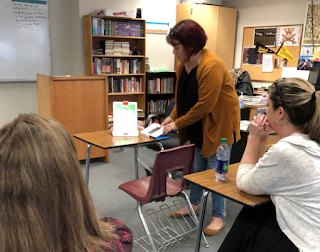Lately, as a Digital Learning Coach I have had the opportunity to spend time with kindergartners and 1st graders. I forgot what it was like to be with 5 & 6 year olds. So, I am always pleasantly surprised and impressed by what they ARE able to 'do' when it comes learning. Admittedly, I'm not familiar with the 'littles' and their abilities as I have spent the last 27 years with 4th graders. So, when people share with me that the little ones can't do this or that I have to respect their expertise.
 |
| Gr 1 Student sharing his GDrawing |
"I thought this lesson was going to be too hard and wasn't sure the kids were going to produce what you wanted."
"First graders can't do that, it's too hard for them to concentrate."
"We usually wait until the end of the year to try something like this."
What I am familiar with though is the power to prove people wrong! (I would challenge my 4th graders all the time only to receive some excellent results.) So I decided to do the same with the "littles" and their teachers.
 |
| Gr 1 Teacher says "we CAN use GSheets! |
Great success! A sense of pride was seen in the smiles and reactions of students as they shared their projects with classmates. Teachers proudly displayed student work in the hallway. Students came up to me and said "We did our own Number of the Day in Google Sheets!" Great to see how teachers and students alike were able to 'show off' the CAN DO attitude!
Students and teachers who have the "I CAN" attitude and mindset can accomplish tasks never before thought possible. We can learn from those 'littles' who consistently take on a challenge to show us "THEY CAN DO IT!"
Resources:
4 Ways to Encourage Growth Mindset in the Classroom - by EdSurge
Power of Yet - Sesame Street Video
Soundtrack for a Growth Mindset - Two Little Birds
What are some ways we can inspire the words, I CAN?


















